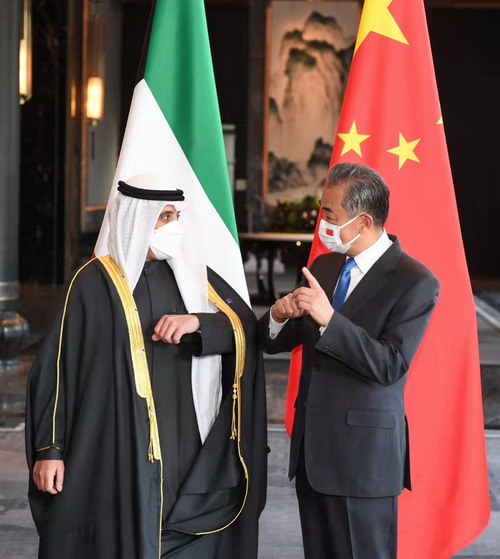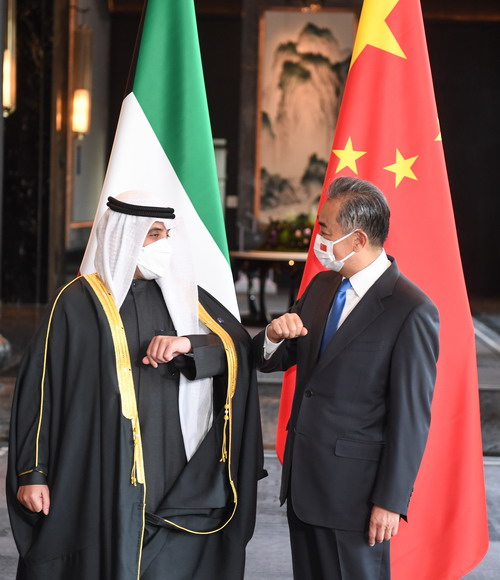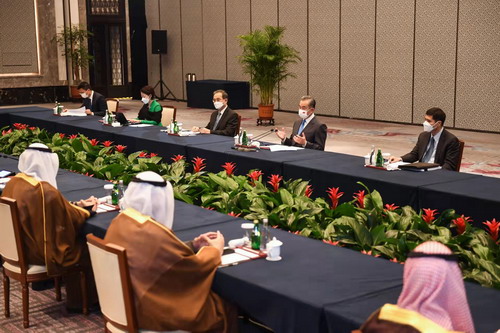Wang Yi Holds Talks with Kuwaiti Foreign Minister and Minister of State for Cabinet Affairs Sheikh Ahmad Nasser Al-Mohammad Al-Sabah

On January 12, 2022, State Councilor and Foreign Minister Wang Yi held talks with Kuwaiti Foreign Minister and Minister of State for Cabinet Affairs Sheikh Ahmad Nasser Al-Mohammad Al-Sabah in Wuxi, Jiangsu Province.
Wang Yi first conveyed President Xi Jinping's cordial greetings to Emir Sheikh Nawaf Al-Ahmad Al-Jaber Al-Sabah, stressing that the two heads of state have established a high level of mutual trust and profound friendship, which provides the most reliable political guarantee for the sustained and sound development of China-Kuwait relations. Wang Yi welcomes Ahmad's first visit to China as Foreign Minister. He said that Kuwait is one of the friendliest countries to China and the first Gulf Arab country to establish diplomatic relations with China. Kuwait took the lead in responding positively to and signing documents on Belt and Road cooperation. China appreciates the fact that Kuwait always pursues a friendly policy towards China and understands and supports China's efforts to maintain its sovereignty, security and development interests. China will continue to be Kuwait's trustworthy partner and support the legitimate and reasonable concerns of Kuwait. China stands ready to work with Kuwait to sum up the successful experience in the development of bilateral relations and plan for future cooperation, so as to push bilateral relations to a new level and keep adding new dimensions to the strategic cooperation between the two countries.
Ahmad conveyed Emir Nawaf's sincere greetings to President Xi Jinping, saying that Kuwait-China relations have become a model for Kuwait's external relations. Kuwait thanks China for its long-term and firm support and sincere assistance to Kuwait. Kuwait cherishes its friendship and cooperation with China, supports China's legitimate position of safeguarding its own interests and opposes the politicization of human rights issues and interference in China's internal affairs. Kuwait is ready to jointly implement the important consensus reached by the two heads of state, strengthen institutionalized communication and turn the grand vision of bilateral relations into practical results.

Both sides agreed to seek greater synergy between the Belt and Road Initiative and Kuwait's "2035 National Vision", speed up the formulation of a five-year cooperation plan, and establish a meeting mechanism for foreign ministers, vice foreign ministers and senior officials at different levels.
Both sides agreed to strengthen cooperation in agriculture and food security and expand cooperation in new energy, 5G communications, smart cities and other high-tech fields. Ahmad stressed, scientific and technological achievements should be shared by all mankind and the rapid improvement of China's scientific and technological capabilities is conducive to improving the well-being of people around the world. Kuwait looks forward to learning from China's advanced scientific and technological experience and Chinese enterprises are welcome to invest and do business in Kuwait.
Both sides agreed to continue to fight the COVID-19 pandemic with solidarity, deepen people-to-people and cultural exchanges and cooperation such as health, education, youth, and sports as well as at the sub-national level, and facilitate personnel exchanges. Ahmad said, Kuwait supports China's hosting of the Beijing Olympic Winter Games and firmly opposes politicizing sports.
The two sides exchanged views on the cooperation between China and the Gulf Cooperation Council (GCC) and agreed to promote the level of China-GCC collective cooperation. Wang Yi introduced the series of consensus reached with GCC Secretary General Nayef Falah Mubarak Al-Hajraf.
The two sides also exchanged views on the regional situation and agreed to push for the political settlement of regional hotspot issues such as those related to Palestine, Yemen, Iraq, Syria, and the Iranian nuclear issue, among others. Wang Yi said, China is glad to see Kuwait play a unique and positive role as a stabilizing force in this regard. At the regional level, we should explore Middle Eastern ways to resolve existing conflicts and disputes. In the multilateral arena, we should uphold and practice multilateralism, uphold the authority of the United Nations, promote democracy in international relations, and safeguard international fairness and justice.


Follow us on WeChat
京ICP备18041594号-1
京公网安备 11010202005508号

Follow us on WeChat


